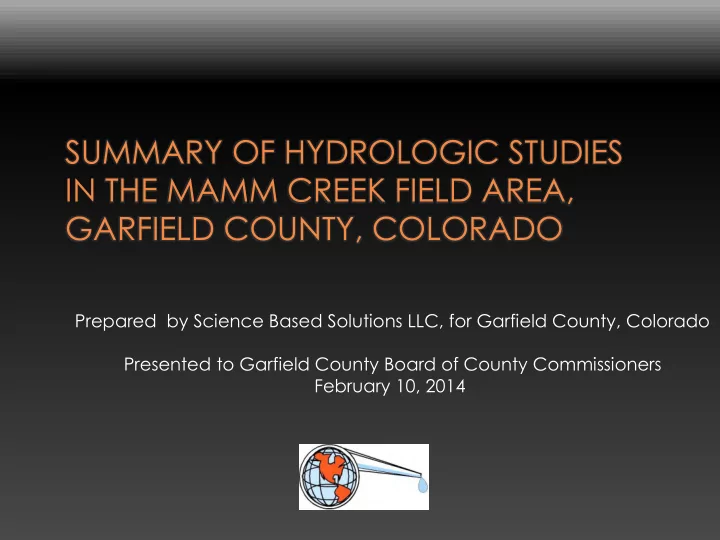

SUMMARY OF HYDROLOGIC STUDIES IN THE MAMM CREEK FIELD AREA, GARFIELD COUNTY, COLORADO Prepared by Science Based Solutions LLC, for Garfield County, Colorado Presented to Garfield County Board of County Commissioners February 10, 2014
ISSUES 2004 • • • • • •
SITUATION 2014 • • • • •
Mamm Creek Field Area South of the Colorado River between Silt and Rifle. Drainage to the north by small streams. Rural with ranches. Wells are in Wasatch Formation have low yields and generally good to poor quality water.
Geologic Framework Wasatch Formation : 1,200-5,400ft thick; From Johnson and Flores (2003) mudstone with lenticular and amalgamated sandstones; one interval has more tabular sand units Williams Fork Formation : fluvial sandstone, marginal marine shale and coal beds and natural gas production Mancos Shale
GEOLOGY OF AREA • • •
GEOLOGY OF AREA • • •
Note proximity of mapped faults to Moon and Miller wells
WEST DIVIDE CREEK SEEP
D RILLING INTO HIGHLY FRACTURED AND FAULTED AREA ( DIVIDE CREEK ANTICLINE ) L OST CONTAINMENT ON WELL G AS ESCAPED INTO SHALLOW W ASATCH FORMATION AND REACHED SURFACE Courtesy EnCana
SEEP TRIGGERS ACTION • • • • • • • • • •
Hydrogeologic Model Water moves at 10 - 50 feet/day Water moves at 0.0007 - 0.23 feet/day
WDC SEEP GROUNDWATER Benzene declined, Methane in monitoring wells had stable concentration with seasonal pattern each year until 2012
METHANE ISOTOPIC DATA
PROGRESS (2006-2012) • • • • • •
Sample deeper Wasatch aquifer to determine vertical gradient And background chemistry
WASATCH AQUIFER NEAR WDC
CONCLUSIONS • • • • •
Recommend
More recommend